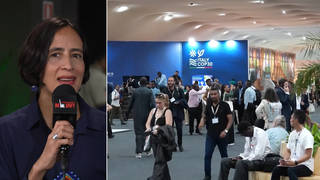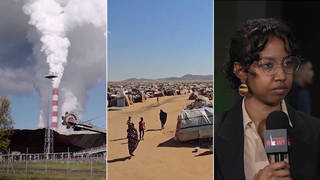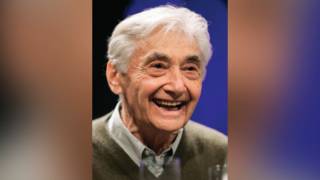
Guests
- Gilbert Achcarprofessor at the School of Oriental and African Studies at the University of London. His most recent books are Marxism, Orientalism, Cosmopolitanism and The People Want: A Radical Exploration of the Arab Uprising.
We discuss the Charlie Hebdo attack in Paris with the Lebanese-French academic Gilbert Achcar, professor at the School of Oriental and African Studies at the University of London. “We have to put all this in context,” Achcar says. “The Western intervention, the Western action in the Middle East, has been creating the ground for all this. This is what I called previously the clash of barbarisms, with a major barbarism represented by Western intervention.” Achcar also discusses the close relationship between the United States and Saudi Arabia, which he calls “the ideological source of the most fanatical, most reactionary interpretation of Islam.”
Tune in on Friday for our continued discussion with Gilbert Achcar.
Transcript
AMY GOODMAN: This is Democracy Now!, democracynow.org, The War and Peace Report. I’m Amy Goodman, with Nermeen Shaikh. The French newspaper Le Monde has just published a horrific photograph of the insides of the magazine office of Charlie Hebdo covered in blood. Nermeen?
NERMEEN SHAIKH: We’re joined now by Gilbert Achcar. He’s a professor at the School of Oriental and African Studies, or SOAS, at the University of London. His most recent books are Marxism, Orientalism, Cosmopolitanism and The People Want: A Radical Exploration of the Arab Uprising.
Welcome to Democracy Now!, Gilbert Achcar. I’d like to begin by asking you about your response to the fact that all the suspects so far identified in this attack yesterday appear to have been French citizens. So could you talk about the position of Muslim communities in France and your response to what happened yesterday and the news about these suspects?
GILBERT ACHCAR: Well, I think that in France or elsewhere in Western countries, and obviously in Europe, the migrant, the communities—sorry, the communities of migrant background, especially when they come from Muslim-majority countries, are subject to forms of racism and various forms of discrimination and oppression, which are the breeding ground for the kind of hatred in response to that societal hatred that I just mentioned. And so, it’s not—I mean, it’s not surprising, in this way.
And more generally, I would say, this is also part of a general dynamics created by facts that were mentioned during the discussion, the previous discussion here with you. The Western intervention, the Western action in the Middle East, has been creating the ground for all this. And this is what I called previously the clash of barbarisms, with a major barbarism represented by Western intervention, by especially the United States’ conduct in this region, provoking a counterbarbarism, which is minor compared to the major one, but which is nevertheless a barbarism, this is. And this, we just had a new illustration of that. But this is part of a clash of barbarisms. We have to understand this. And this—I mean, even if we think of rampage killing, this action, which is absolutely shocking and appalling, but, I mean, it comes—you know, in the list of rampage killing for religious-related reasons, it comes far beyond the Norwegian Islamophobic murder of over 75 people and with—can’t remember the figure, but something like in the hundreds of people wounded—
AMY GOODMAN: Anders Breivik.
GILBERT ACHCAR: —and beyond Baruch Goldstein, the ultra-Zionist extremist who killed over 29 people in ’94 in Palestine.
So, I mean, this—we have to put all this in context and understand that all these appalling features come from somewhere. And this somewhere is, before everything, the action of the West, the responsibility of the West, and also the responsibility of the West and the United States, in particular, in fostering the source, the ideological source, of all this—of the most fanatical, most reactionary interpretation of Islam, that is the Saudi kingdom. The Saudi kingdom has—I mean, the United States has been the godfather of the Saudi kingdom practically since its inception, or since, let’s say, 10 years after it came to existence and when—with the discovery of oil in that country. And this country has been the oldest, most ancient ally of the United States in that part of the world, much, much older ally than Israel or anyone else, and the best ally of the United States, in some way, with a lot of connections and, of course, a lot of economic advantage being taken by the United States from the connection with this kingdom, which is based on the worst possible interpretation of Islam. So, just imagine you had the same, you know, with—
AMY GOODMAN: On that note, we have to end. We’re going to get a minute’s comment from you after the show and post it online, Gilbert Achcar, professor of the School of Oriental and African Studies at University of London.












Media Options